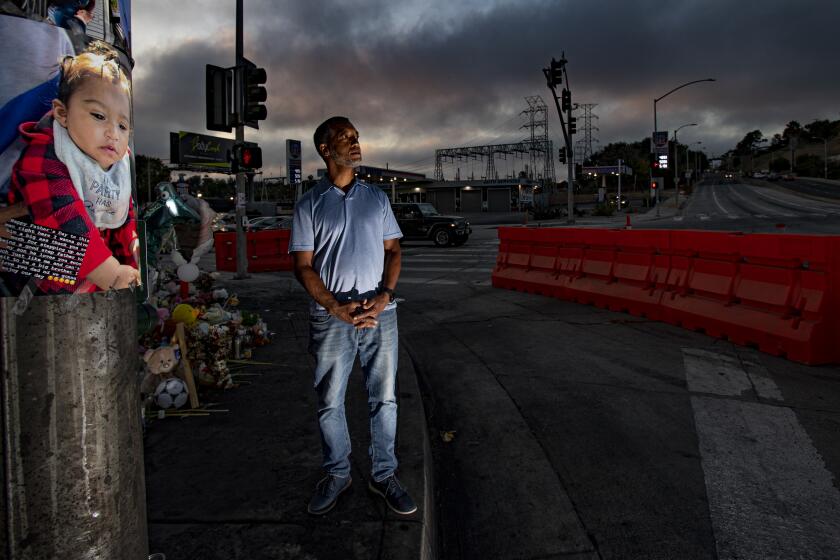L.A. voters to consider ballot plan to add bike lanes, bus lanes, other safety measures

The Los Angeles City Council voted Wednesday to send a measure to the ballot to speed up the installation of bike routes, bus lanes and other transportation projects aimed at making the city safer and more welcoming for bicyclists, pedestrians and bus riders.
The initiative, planned for the 2024 ballot, would force city agencies to make those changes to some of L.A.’s busiest boulevards each time crews do major road work on those streets.
Backers of the measure say it would cut down on traffic fatalities in a city that is frequently lethal for bicyclists and pedestrians, while making it easier for people to get around without relying on cars.
Council members declined to adopt the measure immediately, opting instead to send it to voters. But several also promised to work with activists on an alternative plan that would achieve many of the same goals without a ballot measure.
The alternative plan would go beyond the ballot measure language and ensure that low-income communities, which typically experience a greater share of traffic deaths and injuries, are a priority when streets are redesigned, council members said.
Traffic deaths are piling up at an alarming rate — and the trend doesn’t show signs of letting up.
“Some neighborhoods have smooth sidewalks and streetlights, while other neighborhoods people have to walk in the dark on dirt sidewalks,” said council President Nury Martinez, who represents Panorama City, Arleta and other San Fernando Valley neighborhoods. “We need to make sure that the neighborhoods that have gone without are invested in first.”
The ballot initiative was spearheaded by the group Streets for All, whose members have been frustrated by what they say is the city’s slow pace in carrying out its Mobility Plan. That document, approved in 2015, called for the addition of hundreds of miles of bike lanes or other upgrades to such corridors as Santa Monica, Ventura, Whittier and other boulevards.
That same year, the city embarked on Vision Zero, an initiative aimed at eliminating traffic deaths within 10 years. That program has been viewed by many as a failure, with hundreds of people killed by cars and trucks each year.
The ballot measure would allow residents to sue the city if officials fail to install projects that are identified in the Mobility Plan.
Under the measure, the city would be required to implement those upgrades whenever at least one-eighth of a mile of those streets are repaved or receive other major improvements. Minor repairs, such as filling individual potholes, would not trigger installation of the new safety measures.
Streets for All founder and Chief Executive Michael Schneider expressed disappointment in Wednesday’s vote. He and his allies had been pushing the council to adopt the ballot initiative as an ordinance outright, arguing that the danger faced by Angelenos on city streets is too great to allow additional delays.
If approved by the voters, the measure could not be repealed by the council.
Schneider said he’s skeptical of any council-led effort.
The alternative plan on its own “does not give us enough protection against a future City Council watering it down or reversing it, and that would not be acceptable to us,” he said.
Since 2015, the council has installed only 3% of the projects spelled out in the Mobility Plan, which calls for bus lanes, bike lanes and other improvements on hundreds of miles of city streets.
Silver Lake resident Julie Cash urged the council to adopt the measure immediately as an ordinance, saying many parents in her neighborhood are too scared to walk or bicycle.
“We can’t wait another two years for voters to make the right decision,” Cash said.
Councilman Kevin de León agreed with safety advocates that the city has “slow walked” measures that would make streets less dangerous. Last year, nearly 300 people were killed in traffic crashes, more than a third of them pedestrians, he said.
De León vowed to spend the coming months completing the alternative safety measure.
“Ultimately, there may be no necessary ballot initiative in 2024, because we can land a deal that’s even better,” he said. “And we can make the city of L.A. much better for all Angelenos, irrespective of who you are and where you come from.”
Some of the city’s previous efforts to add bike or bus lanes have been abandoned following neighborhood opposition, with residents and business owners saying they do not want to lose vehicle lanes.
The initiative, titled Los Angeles Safe Streets for All, would shift the power to proponents of bus and bike lanes by allowing them to sue the city if city leaders fail to carry out promised transportation improvements.
The plan calls for long stretches of Ventura, Reseda, Lankershim and Roscoe boulevards in the San Fernando Valley to receive bus lanes or other upgrades.
Some projects have already begun. On a three-mile stretch of Reseda Boulevard, the city has poured $19.5 million into the addition of 11 bus-boarding islands and protected bike lanes. The redesign eliminated 241 parking spaces but left traffic lanes untouched.
Get the lowdown on L.A. politics
Sign up for our L.A. City Hall newsletter to get weekly insights, scoops and analysis.
You may occasionally receive promotional content from the Los Angeles Times.
On the Westside, the city’s plan lays out a similar vision for Lincoln, Sepulveda and Venice boulevards. Rush-hour bus lanes are expected to be added to a mile of Lincoln Boulevard. Meanwhile, the city has proposed adding bus and protected bike lanes on sections of Venice Boulevard, removing a lane of traffic.
John Ma, a West Adams resident who served as a field director for the ballot initiative, urged the council to adopt the measure immediately, saying L.A. has four times the national average of pedestrian fatalities.
“We have an opportunity today to change that,” he said.
Annakaren Ramirez, policy director for the group Pacoima Beautiful, said she too wants new safety measure for pedestrians, bicyclists and bus riders. But she called on council members to continue working on the alternative plan, which seeks to make sure that the city focuses on streets with the greatest number of injuries caused by car crashes.
“This community is bisected by large and dangerous streets that are unsafe,” she said. “And the city needs to make sure that we implement the Mobility Plan in a way that centers on the voices of disadvantaged communities like the northeast Valley.”
More to Read
Sign up for Essential California
The most important California stories and recommendations in your inbox every morning.
You may occasionally receive promotional content from the Los Angeles Times.













